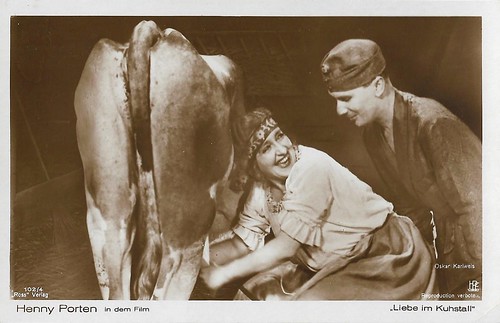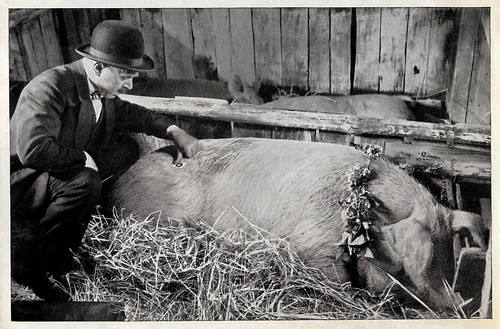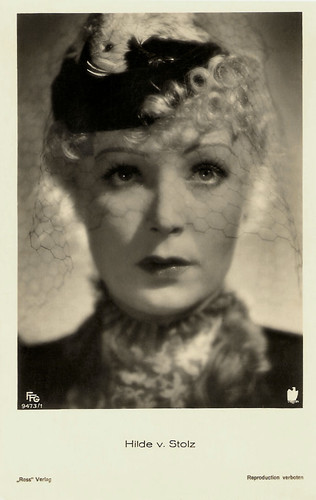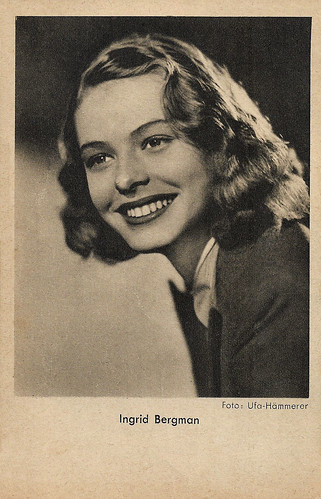
German cigarette card for Hänsom cigarettes by Jasmatzi Cigarettenfabrik G.M.b.H, Dresden/Ross Verlag, Film Series 4 'Aus tönenden Filmen' (From sound films), no. 508. Photo: Froelich-Film. Carl Froelich.

German postcard by Ross Verlag no. 620/5. Photo: Maxim Film. Lotte Neumann in Arme Thea/Poor Thea (Carl Froelich, 1919).

German postcard by Photochemie, no. K. 2650. Photo: Neutral-Film. Ernst Hofmann in Der Adler von Flandern/The Eagle of Flanders, released as Ikarus, der fliegende Mensch/Icarus, the Flying Man (Carl Froehlich, 1919).

German postcard by Ross Verlag, Berlin, no. 631/3, 1919-1924. Photo: Maxim Film. Lotte Neumann in Das Schicksal der Carola von Geldern/The Fate of Carola von Geldern (Carl Froelich, 1919). The man extreme left is Rudolf Letttinger.

German postcard by Ross Verlag, Berlin, no. 29/3. Photo: HPF (Henny Porten-Froelich-Produktion). Henny Porten, Ferdinand von Alten and Livio Pavanelli in Kammermusik/My Bachelor Husbands (Carl Froelich, 1925).
One of the worst transport disasters of the time
Carl August Hugo Froelich was born in Berlin, Germany in 1875. From 1903 Froelich worked with Oskar Messter, one of the pioneers of German cinema. For Messter, he initially worked in the construction department for cinematographic apparatuses. In 1906, he started to work as a cinematographer. As a cameraman for Messter's weekly newsreels, he filmed among many other things the aftermath of a train accident on the Berlin elevated railway on 28 September 1908, one of the worst transport disasters of the time.
In 1913 Froelich made his directorial debut with Richard Wagner (Carl Froelich, William Wauer, 1913) with Giuseppe Becce as the famous German composer. He directed Asta Nielsen in Irrende Seelen/Wandering Souls (Carl Froelich, 1921) which was based on Fyodor Dostoyevsky's 1869 novel ‘The Idiot’.
In 1920, he set up his own production company, Froelich-Film GmbH, in conjunction with film star Henny Porten, who had made her screen debut at the Messter Studio. He produced such films as the Friedrich Schiller adaptation Luise Millerin/Kabale und Liebe (1922) with Lil Dagover, the Fyodor Dostoevsky adaptation Die Brüder Karamasoff/The Brothers Karamazov (1922) starring Fritz Kortner and Emil Jannings, and the drama Mutter und Kind/Mother and Child (1924) with Henny Porten.
During these years he made many films with Porten including Kammermusik/Chamber Music (1925), Das Abenteuer der Sibylle Brant/The Adventures of Sybil Brent (1925), Tragödie/Tragedy (1925) with Walter Janssen, and Die Flammen lügen/The Flames Lie (1926).
In 1926 Froelich and Porten founded the production company Henny Porten-Froelich-Produktion which ended in 1929. They made such comedies as Meine Tante - deine Tante/My Aunt, Your Aunt (1927) and Liebe im Kuhstall/Love in Kuhstall (1928) and dramas like Violantha (1927) with Wilhelm Dieterle and Zuflucht/Refuge (1928) with Franz Lederer.

German postcard by Ross Verlag, no. 1192/6. Photo: Henny-Porten-Film. Henny Porten in Tragödie/Tragedy (Carl Froelich, 1925).

German postcard by Ross Verlag, no. 79/5. Photo: Henny Porten-Froehlich Produktion GmbH. Henny Porten and Walter Slezak in Die grosse Pause/The Big Break (Carl Froehlich, 1927).

German postcard by Ross Verlag, no. 100/2. Photo: Alex. Schmoll / HPF (Henny Porten Film). Henny Porten and Franz Lederer in Zuflucht/Refuge (Carl Froelich, 1928).

German postcard by Ross Verlag, no. 102/4. Photo: Henny Porten Freuhlich-Produktion. Henny Porten and Oskar Karlweis in Liebe im Kuhstall/Love in the Cowshed (Carl Froelich, 1928).

German Postcard by Ross Verlag, no. 109/1. Photo: Henny Porten Film. Henny Porten in Die Frau, die jeder liebst, bist Du/The woman everyone loves is you! (Carl Froehlich, 1929).
A lesbian classic
Carl Froelich made one of the first German sound films, Die Nacht gehört uns/The Night Belongs To Us (1929), starring Hans Albers. In 1930 he took over two glasshouses in Berlin-Tempelhof, which had been used as studios in the days of silent film. He converted them to sound film studios. Here he produced many films, including the short film Das Schönheitsfleckchen/The Beauty Spot (Rolf Hansen, 1936), the first German drama film in colour.
In 1931 he was advisor, credited as ‘senior artistic director’, to Leontine Sagan's famous boarding-school film Mädchen in Uniform/Girls in Uniform (1931). The film is now seen as a lesbian classic. By 1933 Froelich was one of Germany's most noted film artists, producing successful films with the stars of the period, including Hans Albers, Heinz Rühmann, Ingrid Bergman and Zarah Leander.
Froelich became a member of the National Socialist Party in 1933 and took over the direction of the Gesamtverbandes der Filmherstellung und Filmverwertung (Union of Film Manufacture and Film Evaluation). For the Reich Propaganda Directorate of the NSDAP, he directed the Propaganda film Ich für dich, du für mich/I'm for You, You're for Me (1934). Some of the best-known films he made during this period were: Heimat/Homeland (1938) starring Zarah Leander, Das Herz der Königin/The Queen's Heart (1940), an anti-British historical film about Mary, Queen of Scots (also Zarah Leander), and the comedy Der Gasmann/The Gasman (1941) in which Heinz Rühmann plays a gas-meter reader suspected of being a foreign spy.
In 1937 Froelich was awarded a professorship and in 1939 was appointed president of the Reichsfilmkammer, an office which he retained until the end of the war in 1945. The Reichsfilmkammer was a subordinate to the Reichskulturkammer, which as a National Socialist trade organisation regulated and controlled access to all artistic professions. He was one of the few filmmakers who received the title ‘Filmprofessor’ from Reich Minister of Propaganda Joseph Goebbels.
After the end of the war, Froelich was arrested and in 1948 he was de-Nazified. His studio had been badly damaged during the war and did not resume production. He directed only two more films before his death: the comedies Drei Mädchen spinnen/Three Girls Spinning (1950) and Stips (1951) with Gustav Fröhlich. Carl Froelich died in 1953 in Berlin at 77. He was married to Emmy Hoffert (1905-1940) and Edith Faust (1941-1953).

Dutch Postcard by M. Bonnist & Zonen, Amsterdam, Z., no. 104 e. Photo: Fim Film, Amsterdam. Dorothea Wieck and Hertha Thiele in Mädchen in Uniform/Girls in Uniform (Leontine Sagan, Carl Froelich, 1931).

German collector card by Ross Verlag in the series 'Vom Werden deutscher Filmkunst - Der Tonfilm', album no. 11, picture no. 146, group 44. Photo: Nero-Porten-Film. Henny Porten and Gustaf Gründgens in Luise, Königin von Preußen/Luise, Queen of Prussia (Carl Froelich, 1931).

German collector card by Ross Verlag in the series 'Vom Werden deutscher Filmkunst - Der Tonfilm', album no. 11, picture no. 47. Photo: Froelich-Film. Ida Wüst and Paul Kemp in Mieter Schulze gegen alle/Tenant Schulze against everyone (Carl Froelich, 1932).

German collector card by Ross Verlag in the series 'Vom Werden deutscher Filmkunst - Der Tonfilm', album no. 11, picture no. 46, group 44. Photo: Froelich-Film. Margot Wagner and Karl Ludwig Diehl in Volldampf voraus!/Full steam ahead! (Carl Froelich, 1934).

German collector card by Ross Verlag in the series 'Vom Werden deutscher Filmkunst - Der Tonfilm', album no. 11, image no. 87. Photo: Itala-Film. Gustav Fröhlich in Abenteuer eines jungen Herrn in Polen/Love and Alarum (Gustav Froelich, 1934).

German collector card by Ross Verlag in the series 'Vom Werden deutscher Filmkunst - Der Tonfilm', album no. 11, picture no. 167. Photo: Froelich-Film. Wilhelm P. Krüger in Krach um Jolanthe/Noisy Jolanthe (Carl Froelich, 1934).

German postcard by Ross Verlag, no. 6810/1, 1931-1932. Photo: Angelo Photos. Gitta Alpar and Gustav Fröhlich in Gitta entdeckt ihr Herz/Gitta Discovers Her Heart (Carl Froelich, 1932).

German postcard by Ross Verlag, no. 7159/1, 1932-1933. Photo: FFG. Max Hansen and Gitta Alpar in Die - oder keine/This One or None (Carl Froelich, 1932).

German Postcard by Ross Verlag, no. 7363/1, 1933-1934. Photo: FFG. Adele Sandrock in Liebe auf den ersten Ton/Love at First Sight (Carl Froelich, 1932).

German postcard by Ross Verlag, Berlin, no. 175/3. Photo: Alex Schmoll / FFG. Ludwig Trautmann, Olga Tschechowa and Elga Brink in Der Choral von Leuthen/The Anthem of Leuthen (Carl Froelich, 1933).

German postcard. Photo: Europa Verleih. Peter Voss, Albert Lieven and Hertha Thiele in Reifende Jugend/Ripening Youth (Carl Froelich, 1933).

German postcard by Ross Verlag, no. 9473/1, 1935-1936. Photo: FFG (Froelich-Film GmbH). Hilde von Stolz in Traumulus (Carl Froelich, 1936).

German postcard. Photo: Ufa / Hämmerer. Ingrid Bergman in Die vier Gesellen/The Four Companions (Carl Froelich, 1938).

German postcard by Das Illustrierte Blatt. Photo: Ufa / Lindner. Willy Birgel and Lotte Koch in Das Herz der Königin/Mary Queen of Scots (Carl Froelich, 1940).
Sources: Wikipedia (German and English), and IMDb.
No comments:
Post a Comment